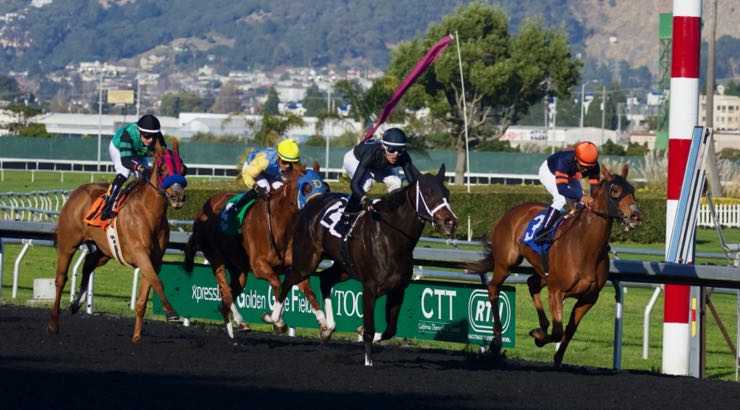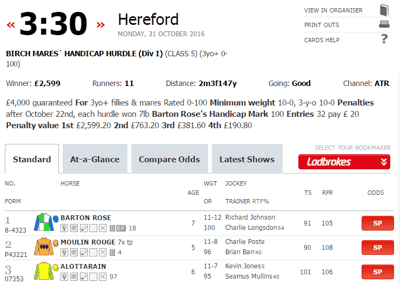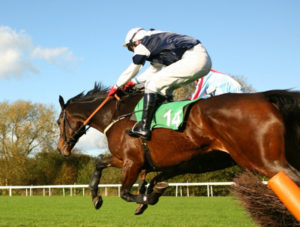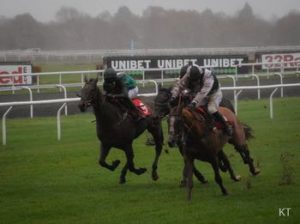 Horse racing is almost unique among sports in that many feel the only reason that it exists is to bet on it. The history of racing horses and indeed betting on the outcome goes back a long, long way, although in its most modern form it started in the 17 century. Racing and betting are synonymous though and today many people in the UK who rarely, if ever, gamble, make an exception for the Grand National.
Horse racing is almost unique among sports in that many feel the only reason that it exists is to bet on it. The history of racing horses and indeed betting on the outcome goes back a long, long way, although in its most modern form it started in the 17 century. Racing and betting are synonymous though and today many people in the UK who rarely, if ever, gamble, make an exception for the Grand National.
Of course, this strong link between horse racing and wagering is great for us as it means there is never a shortage of top quality equine events to bet on. There are meetings almost every single day of the year and most days there are multiple meets at as many as seven different courses and that’s just in the UK! With several races at each meeting, and bookies and broadcasters covering events from all over the world one thing that horse racing fans are never short of is action.
- In This Article:
- Bookmakers
- How to Bet
- Betting Rules
- Betting Strategy
- Latest Results
How To Bet On Horse Racing

Horse racing is known as the Sport of Kings, thanks to its longstanding royal connections. It is also popular at every level of society and this interest makes it a wealthy and flourishing sport on which to bet. Bookmakers are always creating new and exciting markets but here we take a look at the major ones for horse racing.
Horse Racing Bets
| Bet Types | Descriptions |
|---|---|
| To Win | The simplest bet and the most popular by some distance is betting on a single horse to a given race, often also called a single or win single. Whether you stick a pin in the newspaper or study the form for days, this bet is the one most people opt for. |
| Each Way | Each way betting can be done in most sports but is particularly relevant to horse racing. It is a split bet, with half your stake going on the horse to win and half going on it “to place”. To place means to finish in the top two, three or four (or sometimes more) depending on the number of horses in the race and you get paid between half and a fifth of the standard odds.
If your horse wins you get paid on both parts of the bet, whilst if it finishes second (or third and so on) you only win on that part of it. |
| Accumulator | An accumulator is a bet with more than one non-related wager. Again, it can be applied to any sport but is very common in horse race betting, with doubles and trebles right up to huge accumulators all very popular.
A double would involve picking two horses to win separate races. To win you need both bets to come in and your stake and winnings from the first roll over onto the second, making huge wins possible. |
| Forecast | This involves picking the top two horses in any given race and can be done as either a straight forecast (the top two in the right order) or a reverse (the top two in either order). |
| Tricast | Exactly the same as a Forecast, except you’re picking the top three horses. Tricasts are tricky to pull off, but can lead to huge winnings. |
| Place Betting | Like betting each way but without the win portion of the bet, with place betting you are backing a horse to finish in the top two, three or four (including winning) at reduced odds. |
| Specials | There are a huge number of specials offered in horse racing, such as which jockey or trainer will ride or saddle the most winners in a season or at a particular festival, and others relating to the performance of a particular horse, such as by how far it will win a specific race. |
| Combination Bets | These have unusual names such as Yankee, Trixe, Canadian or Super Heinz and are ways of covering a range of accumulators. For example, if you want to bet on four races you could pick a four horse accumulator and place one bet or you could place four singles.
Another option would be a Yankee, which would be a total of 11 bets, including the accumulator, as well as four trebles and six doubles (covering all options if two or more of the four win). A Lucky 15, which is a full cover bet (I think the name says it all), is like a Yankee but includes the four singles as well. |
| Ante-Post Betting | These are bets placed in advance of a race, prior to the final declarations being posted. For example quite often after one big race finishes, the bookies offer the ante-post odds for the race the following year or sometimes for the winner to triumph at the next big race. |
Horse Racing Betting Rules
There are a few little rules to be aware of when betting on horses and most concern the odds.
Ante Post Betting
Firstly, if you bet on an ante-post market you normally lose your bet if your pick doesn’t race. For this reason ante-post odds are often very high but you could lose your bet without ever even seeing your horse race.
Rule 4 Deductions
If you steer clear of antepost betting you should be aware of Rule 4. This is a means by which the odds are reduced if a horse withdraws once the declarations have been posted. For example, in a three horse race with a strong favourite, if the favourite withdraws the odds on the other two will become a lot lower, even if you have placed your bet and accepted “guaranteed” odds.
Starting Price
Another occasion on which you might get lower odds than you expected is if you choose to back a horse at the starting price or SP. If you see a horse at 4/1 and the horse gets heavily backed it may start the race at 2/1. Unless you accepted the 4/1 you will get paid at 2/1. Some bookies offer “Best Odds Guaranteed”, meaning if you take the price at the time of placing the bet you will get the higher odds if they drift out by the start. NB – this has no bearing on Rule 4.
First Past the Post
The final thing to consider is that some bookmakers will only pay out on the first horse past the post. This means that if you back a horse that finished second but then the winner was disqualified your bet would not be a winning one. Some bookmakers pay out on both results which is worth looking out for.
Betting Strategy
 As with any sports betting, research and knowledge are the keys to success. The best strategy with horse racing is to study the form as much as possible, looking out for odds that are out of line. You must consider the form of the jockey, the stable and the horse, as well as the weather (and ground) conditions, previous form at the track, how long it is since the horse last raced and, crucially, the standard of its previous races and its upcoming competition.
As with any sports betting, research and knowledge are the keys to success. The best strategy with horse racing is to study the form as much as possible, looking out for odds that are out of line. You must consider the form of the jockey, the stable and the horse, as well as the weather (and ground) conditions, previous form at the track, how long it is since the horse last raced and, crucially, the standard of its previous races and its upcoming competition.
Many of the national newspapers carry tipping columns and these can be a useful source of information, especially at a time when a tipster is on a successful run. Paid tipping services are invariably a bad idea, not least because by the time you get the tip the odds are likely to be lower than the price at which they would be a good bet. Just ask yourself, if the tips were so good, why would anyone give them away, or even sell them?
There are no quick and easy tricks but I urge you put the time in you will see the rewards. For most people betting on the horses is probably best viewed as fun, rather than work, but for those prepared to watch hours of footage, looking for horses with unrecognised potential there is certainly scope for substantial reward.
National Hunt v Flat Racing
Horse racing is one of the most popular sports in the world with punters, with races to bet on virtually every single day, all year around. There are a few variations of horse racing the main distinctions being between flat and jump. However, there are lesser known events such as point to point races, harness racing and endurance, with different countries having their own specific races and traditions.
Flat Racing
 The difference between the two types of racing are fairly obvious. In flat racing there are no fences or hurdles to be jumped and these contests are generally shorter in length. Races may be as short as just 5 furlongs and they are rarely much more than a mile and a half. The flat season generally runs from April to mid-November, with the harder summer ground unsuitable for the higher impact of jumps racing. That said, there is the winter flat season, with limited and usually lower class racing, often on all-weather tracks, during the colder months.
The difference between the two types of racing are fairly obvious. In flat racing there are no fences or hurdles to be jumped and these contests are generally shorter in length. Races may be as short as just 5 furlongs and they are rarely much more than a mile and a half. The flat season generally runs from April to mid-November, with the harder summer ground unsuitable for the higher impact of jumps racing. That said, there is the winter flat season, with limited and usually lower class racing, often on all-weather tracks, during the colder months.
National Hunt
 Jumps racing, officially called National Hunt, or NH, unsurprisingly features some form of obstacle. These are broadly divided into higher, more rigid fences for steeplechase races and smaller, more forgiving hurdles. Just to keep us all on our toes there are bumper races, which, although part of the NH calendar, are actually flat, with no obstacles. These are used as training races for inexperienced horses who are expected to go on to become National Hunt racers.
Jumps racing, officially called National Hunt, or NH, unsurprisingly features some form of obstacle. These are broadly divided into higher, more rigid fences for steeplechase races and smaller, more forgiving hurdles. Just to keep us all on our toes there are bumper races, which, although part of the NH calendar, are actually flat, with no obstacles. These are used as training races for inexperienced horses who are expected to go on to become National Hunt racers.
Jumps races tend to be longer, with the shortest races usually taking place over around 2 miles and the longest going right up to 4 miles or more. The NH season generally runs from mid- to late-October until the following April. Again, however, as with the flat season, you may see less prestigious jumps races at more or less anytime throughout the calendar, especially at courses less prone to drying out.
Major Races in the UK

Horse racing in Britain is the second largest spectator sport and one of the longest established, with racing dating back to many centuries ago. The Jockey Club, Britain’s largest commercial organisation in the sport, was founded way back in 1750. Amazingly the oldest British race, the Kiplingcotes Derby, dates way back to 1519!
As each year has passed by, horse racing in the UK and worldwide has grown. There’s more money involved in the sport now than there’s ever been, generating over £3.7 billion for the British economy.
Gambling on the horses has long been one of the cornerstones of the British betting industry. Many of the UK’s top betting organisations sponsor several big races throughout the year. As early as 1938, approximately £500,000,000 was being gambled on horse racing in England (according to the Christian Social Council Committee on Gambling) and the figures these days are astronomical.
Over the course of a season in the UK, there are a number of huge meetings and races in flat racing and National Hunt (jumps) racing. We’re here to take a look at the biggest and most prestigious races on the British horse racing calendar.
Cheltenham Gold Cup
 One of the biggest steeplechases in the world is the Cheltenham Gold Cup, which takes place over three miles and 22 fences at the hugely popular Cheltenham Festival every March at Cheltenham Racecourse. It’s without doubt the most prestigious of all National Hunt events, and is the most valuable non-handicap chase in Britain.
One of the biggest steeplechases in the world is the Cheltenham Gold Cup, which takes place over three miles and 22 fences at the hugely popular Cheltenham Festival every March at Cheltenham Racecourse. It’s without doubt the most prestigious of all National Hunt events, and is the most valuable non-handicap chase in Britain.
The first Gold Cup took place way back in July 1819. Back then, it was a flat race contested over three miles on Cleeve Hill, which overlooks the present venue. The first race to be held over jumps was in March 1924. During World War II, the Gold Cup was cancelled twice, in 1943 and the year after.
The most successful horse in Gold Cup history is Golden Miller, who won this prestigious race on five occasions, in consecutive years from 1932 to 1936. The leading jockey with four wins remains Pat Taaffe, who won three times on the legendary Arkle and once on Fort Leney.
As of 2016, the prize money stood at £575,000, with the winner bagging £327,326. The Cheltenham Gold Cup is watched by millions of people worldwide, making it one of the biggest racing events on the calendar. Modern legends such as Best Mate and Kauto Star are among the recent multiple winners of the Gold Cup, the highlight of the last day of the Festival.
Grand National

The Grand National is arguably the most popular and well-known horse race in the world. First run in 1839, the National is now run over a gruelling four miles and 30 fences. It’s the most valuable jump race in Europe, with a prize fund of £1m in 2017. The event is renowned for attracting interest from people who don’t normally bet on or watch horse racing.
The Grand National takes place at Aintree, Liverpool, usually in early April every year. The course is extremely famous, with jumps such as Becher’s Brook. The Chair and the Canal Turn becoming famous in their own right. Those particular jumps coupled with the distance of the event make this race “the ultimate test for horse and rider”. Betting on the National is something of a lottery, with winners at 33/1, 50/1 and even 100/1 not especially uncommon.
Red Rum, who won in 1973, 1974 and 1977, remains the leading horse in Grand National history. George Stevens, who won five Nationals on four different horses, is the most successful jockey. Meanwhile, George Dockeray, Fred Rimell and Ginger McCain share four wins each as the leading trainers (as of 2017).
The Grand National has been broadcast live on free-to-air British terrestrial television since 1960. As of 2017, ITV has the UK rights. An estimated 600 million people watch the Grand National in over 140 countries each year.
The Epsom Derby

The Epsom Derby is open to three-year-old thoroughbred colts and fillies, and is run over a distance of one mile, four furlongs on the first Saturday of June each year at Epsom Racecourse. The race serves as the middle leg of the Triple Crown, after the 2000 Guineas and before the St Ledger. The inaugural running of The Derby was held on May 4th, 1780, and was won by Diomed.
Lester Piggott won the Epsom Derby more than any other jockey, with nine wins to his name. The longest winning margin was in 1981 when Shergar won by a huge 10 lengths. The most runners in a Derby has been 34 (1862), with the least being just four, all the way back in 1794.
St Ledger Stakes

The St Leger is a Group 1 flat horse race and, as said, is the final leg of the English Triple Crown. It also completes the Fillies’ Triple Crown, following on from the 1000 Guineas and the Oaks. The race is run over one mile, six furlongs at Doncaster each September.
Established in 1776, the St Leger is the oldest of Britain’s five Classic races. It’s also the last of the five to be run each year, as well as the longest distance of all five. The first running of the St Leger was in September 1776. The purse as of 2017 is £700,000, with the winner getting £396,970.
Bill Scott is the most successful jockey, with nine victories from 1821 to 1846. Last year (2017), Ryan Moore won aboard Capri. Thousands of fans flock to Doncaster Racecourse each year to watch the final Classic of the season and the atmosphere is lively to say the least.
2000 Guineas Stakes

The 2000 Guineas, the first of the Triple Crown races, is run on the Rowley Mile at Newmarket Racecourse over a distance of one mile, and usually takes place in late April or early May each year. Along with The Derby and St Ledger, the 2000 Guineas is a huge horse race on the British racing calendar.
The 2000 Guineas Stakes was first run on 18th April 1809. By the mid-1860s, the 2000 Guineas was regarded as one of Britain’s most prestigious races for three-year-olds. Since 2001, the 1000 & 2000 Guineas have offered equal prize money – in 2012, both races had a prize fund of £350,000 and that has now increased to a massive £500,000.
Aidan O’Brien is the leading trainer in the 2000 Guineas with eight wins, winning his first in 1998 (King of Kings), and his last in 2017 (Churchill). The leading jockey is Jem Robinson, who won nine times from 1825 to 1848.
Other Notable Mentions

There are far too many huge races on the UK calendar for us to list them all. The other two flat Classics, The Epsom Oaks and the 1000 Guineas are huge, filly-only affairs. Also, the King George VI & Queen Elizabeth Stakes has the second largest prize fund in Britain, only behind The Epsom Derby.
When it comes to NH racing, some of the other huge races are the other feature races on each day at Cheltenham. These are the Champion Hurdle, the Champion Chase and the Stayers’ Hurdle. The King George VI Chase and the Betfair Chase are just two of the other massive highlights of the jumps campaign.
As well as these brilliant British contests, there are also similar races of considerable prestige in Ireland. Each of the five flat Classics has an Irish equivalent whilst there are a number of massive jumps contests too, such as the Ryanair Gold Cup, Irish Gold Cup and Lexus Chase.
Several other big races take place annually all over the world. In America, the Breeders’ Cup Classic is the richest horse race in the US. Despite the first race taking place in 1984, the Breeders’ Cup Classic has grown enormously over time. The Kentucky Derby is arguably the most popular horse race in the world. The 1.25-mile race is the leading leg of America’s Triple Crown, and is known as the ‘Fastest Two Minutes in Sport’.
The richest horse race in the world is the Dubai World Cup, which has a prize pool of a whopping $12m at the time of writing. Another notable mention is the Prix de L’Arc de Triomphe, which takes place at Longchamp Racecourse in Paris. Lastly we should mention the “race that stops the nation” the Melbourne Cup. Although a flat race, this is the Aussie equivalent of the Grand National in that there is huge prize money and the race has a cultural significance even for those with little interest in the sport.
Recent Racing Results
| Start Date | Race | Course | Winner |
|---|---|---|---|
| 20th Apr 2024 | Scottish Champion Hurdle | Ayr | Favour And Fortune (5/1) |
| 20th Apr 2024 | Scottish Grand National | Ayr | Macdermott (18/1) |
| 13th Apr 2024 | Grand National | Aintree | I Am Maximus (7/1) |
| 13th Apr 2024 | Liverpool Hurdle | Aintree | Strong Leader (8/1) |
| 13th Apr 2024 | Mersey Novices' Hurdle | Aintree | Brighterdaysahead (6/5) |
| 13th Apr 2024 | Maghull Novices' Chase | Aintree | Found A Fifty (11/8) |
| 12th Apr 2024 | Topham Handicap Chase | Aintree | Arizona Cardinal (20/1) |
| 12th Apr 2024 | Melling Chase | Aintree | Jonbon (11/10) |
| 12th Apr 2024 | Top Novices' Hurdle | Aintree | Mystical Power (11/10) |
| 12th Apr 2024 | Mildmay Novices' Chase | Aintree | Inothewayurthinkin (6/4) |
Upcoming Fixtures
| Date | Day | Course | Type | Track |
|---|---|---|---|---|
| 26/04/2024 | Friday | Doncaster | Flat | Turf |
| 26/04/2024 | Friday | Perth | Jump | Turf |
| 26/04/2024 | Friday | Sandown Park | Flat | Turf |
| 26/04/2024 | Friday | Chepstow | Jump | Turf |
| 26/04/2024 | Friday | Newcastle | Flat | AWT |
| 27/04/2024 | Saturday | Haydock Park | Flat | Turf |
| 27/04/2024 | Saturday | Leicester | Flat | Turf |
| 27/04/2024 | Saturday | Ripon | Flat | Turf |
| 27/04/2024 | Saturday | Sandown Park | Jump | Turf |
| 27/04/2024 | Saturday | Doncaster | Flat | Turf |
| 27/04/2024 | Saturday | Wolverhampton | Flat | AWT |
| 28/04/2024 | Sunday | Wetherby | Flat | Turf |
| 28/04/2024 | Sunday | Bath | Flat | Turf |
| 28/04/2024 | Sunday | Southwell | Flat | AWT |
| 29/04/2024 | Monday | Southwell | Flat | AWT |
| 29/04/2024 | Monday | Ayr | Flat | Turf |
| 29/04/2024 | Monday | Windsor | Flat | Turf |
| 29/04/2024 | Monday | Wolverhampton | Flat | AWT |
| 30/04/2024 | Tuesday | Brighton | Flat | Turf |
| 30/04/2024 | Tuesday | Nottingham | Flat | Turf |
| 30/04/2024 | Tuesday | Great Yarmouth | Flat | Turf |
| 30/04/2024 | Tuesday | Catterick | Flat | Turf |
| 01/05/2024 | Wednesday | Ascot | Flat | Turf |
| 01/05/2024 | Wednesday | Pontefract | Flat | Turf |
| 01/05/2024 | Wednesday | Wolverhampton | Flat | AWT |
| 01/05/2024 | Wednesday | Brighton | Flat | Turf |
| 01/05/2024 | Wednesday | Kempton Park | Flat | AWT |
| 02/05/2024 | Thursday | Redcar | Flat | Turf |
Index of Notable Races
- 1000 Guineas
- 2000 Guineas
- Aintree Bowl Chase
- Aintree Hurdle
- Albert Bartlett Novices’ Hurdle
- Anniversary 4-Y-O Hurdle
- Arkle Chase
- Arkle Trial Novices' Chase
- Ascot Challenge Cup
- Ascot Chase
- Ascot Gold Cup
- Ascot Silver Cup
- AW 3 Year Old Championships
- AW Championships Marathon
- AW Fillies' & Mares' Champs
- AW Middle Distance Champs
- AW Mile Championships
- AW Sprint Championships
- Ayr Gold Cup
- Badger Chase
- Becher Chase
- Belmont Stakes
- bet365 Celebration Chase
- bet365 Gold Cup
- Betfair Chase
- Betfair Hurdle
- Betfair Stayers’ Handicap Hurdle
- Breeders' Cup Classic
- British Champions Sprint Stakes
- Brown Advisory Novices’ Chase
- Bunbury Cup
- Cambridgeshire Handicap
- Cammidge Trophy
- Celebration Mile Stakes
- Cesarewitch Stakes
- Challow Novices’ Hurdle
- Champagne Stakes
- Champion Bumper
- Champion Hurdle
- Champion Stakes
- Cheltenham Gold Cup
- Chester Cup
- Chester Vase
- Cheveley Park Stakes
- Christmas Hurdle
- Clarence House Chase
- Close Brothers Mares’ Hurdle
- Commonwealth Cup
- Coral Finale Juvenile Hurdle
- Coral Gold Cup
- Coral Trophy Handicap Chase
- Coral-Eclipse
- Coronation Cup
- Coronation Stakes
- Cotswold Chase
- Coventry Stakes
- Dante Stakes
- December Gold Cup
- Dewhurst Stakes
- Doncaster Cup
- Dubai World Cup
- Duchess Of Cambridge Stakes
- Duke Of Cambridge Stakes
- Duke Of York Stakes
- Ebor Handicap
- Eider Handicap Chase
- Epsom Dash Handicap
- Epsom Derby
- Epsom Oaks
- Falmouth Stakes
- Festival Hunters' Chase
- Fighting Fifth Hurdle
- Fillies & Mares Stakes
- Fillies’ Mile
- Formby Novices’ Hurdle
- Gallagher Novices’ Hurdle
- Golden Mile Handicap
- Goodwood Cup
- Grand National
- Grand National Trial
- Grand Sefton Chase
- Great Voltigeur Stakes
- Great Yorkshire Handicap Chase
- Greatwood Hurdle
- Hardwicke Stakes
- Hatton's Grace Hurdle
- Henry VIII Novices' Chase
- Hungerford Stakes
- Hyde Novices' Hurdle
- Imperial Cup
- International Hurdle
- Irish 1000 Guineas
- Irish 2000 Guineas
- Irish Champion Hurdle
- Irish Champion Stakes
- Irish Derby
- Irish Gold Cup
- Irish Grand National
- Irish Oaks
- Irish St. Leger
- Jewson Handicap Chase
- John Smith’s Cup
- Juddmonte International
- July Cup Stakes
- Kameko Futurity Trophy Stakes
- Kauto Star Novices’ Chase
- Kentucky Derby
- King Charles III Stakes
- King Edward VII Stakes
- King George Stakes
- King George VI And Queen Elizabeth Stakes
- King George VI Chase
- Ladbrokes Champion Chase
- Lennox Stakes
- Lincoln Handicap
- Liverpool Hurdle
- Lockinge Stakes
- Long Distance Cup
- Long Walk Hurdle
- Lonsdale Cup
- Maghull Novices' Chase
- Manifesto Novices' Chase
- Matheson Hurdle
- Melbourne Cup
- Melling Chase
- Mersey Novices' Hurdle
- Middle Park Stakes
- Midlands Grand National
- Mildmay Novices' Chase
- Mill Reef Stakes
- Nassau Stakes
- Norfolk Stakes
- Northumberland Plate
- Nunthorpe Stakes
- Ormonde Stakes
- Paddy Power Gold Cup
- Pegasus World Cup
- Pertemps Final Handicap Hurdle
- Peterborough Chase
- Phoenix Stakes
- Prince Of Wales’s Stakes
- Princess Of Wales’s Stakes
- Prix de l’Arc de Triomphe
- Punchestown Champion Chase
- Punchestown Champion Hurdle
- Punchestown Gold Cup
- Queen Anne Stakes
- Queen Elizabeth II Jubilee Stakes
- Queen Elizabeth II Stakes
- Queen Mary Stakes
- Queen Mother Champion Chase
- Ribblesdale Stakes
- Ryanair Chase
- Saudi Cup
- Savills Chase
- Scilly Isles Novices' Chase
- Scottish Champion Hurdle
- Scottish Grand National
- Sefton Novices' Hurdle
- Shloer Chase
- Sprint Cup Stakes
- St James’s Palace Stakes
- St Leger Stakes
- Stayers’ Hurdle
- Stewards’ Cup
- Sun Chariot Stakes
- Supreme Novices’ Hurdle
- Supreme Trial Novices' Hurdle
- Sussex Stakes
- Tattersalls Gold Cup
- Tingle Creek Chase
- Top Novices' Hurdle
- Topham Handicap Chase
- Triumph Hurdle
- Triumph Hurdle Trial
- Turners Novices’ Chase
- Weatherbys Super Sprint
- Welsh Grand National
- WillowWarm Gold Cup
- Wokingham Stakes
- Yorkshire Cup
- Yorkshire Oaks